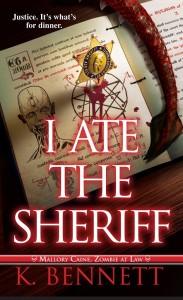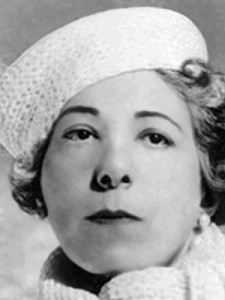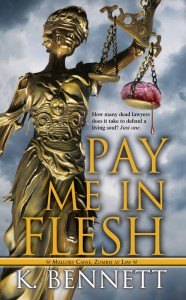It’s my pleasure to welcome K. Bennett to TKZ. K’s third Mallory Caine, Zombie-at-Law book, I ATE THE SHERIFF, is releasing this week. I caught up with K. Bennett at Duke’s in Malibu, where he was eating fish tacos and counting the pelicans outside the window.
JSB: What was the inspiration for your series about a zombie lawyer?
KB: Money.
JSB: Could you be a bit more specific?
KB: A publisher offered me money for the concept and my agent and I thought it would be a good idea to a) accept the money; and b) write the books.
JSB: When publishers give you money they usually like you to write the books, right?
KB: That’s been the standard, yes. But I also loved the idea. Zombies were hot at the time, but only as monsters. I thought it was high time a zombie got to be the hero.
JSB: So you’re saying it’s okay to write for the money?
KB: You’re an odd person.
JSB: Excuse me?
KB: Is it okay for a plumber to work for money?
JSB: Mine certainly does.
KB: Okay then. If he’s a good plumber, you don’t mind paying him. If someone’s a good writer, readers don’t mind paying for the books. And the authors get a piece of that transaction. Writing for money is a good thing, because the only way to make money, generally speaking, is to create value. For a writer, that means writing a great book. The two things—money and excellence—go together.
JSB: How did you happen to make your zombie character a lawyer?
KB: Many people think there really is no difference.
JSB: You say you sold the concept. How did you do that?
KB: I put together a précis and the first few chapters.
JSB: Précis?
KB: Basically a tagline, logline and summary. The tagline was: In L.A. practicing law can be hell. Especially if you’re dead.
The logline was based on the first novel, PAY ME IN FLESH: A zombie criminal lawyer defends a vampire hooker accused of the crime the lawyer herself has committed, even as a zombie-killer closes in and the love of her former life comes back as the Deputy DA she must oppose.
The series summary was a few paragraphs, and included world building: all sorts of demonic and paranormal activity is breaking out in Los Angeles, leading to the theory that Satan is setting up a war headquarters here for a new assault on heaven and earth.
JSB: You’ve chosen to use a pseudonym for this series. Can I ask why?
KB: Sure.
[Silence]
JSB: Um, why?
KB: No comment.
JSB: I’ll pick up the tab on your fish tacos if you tell me.
KB: Done. I have another name that is an established brand. These books are so different I wanted an easy way for readers to see the distinction. The covers and the pen name do that.
JSB: Can you tell us your real name?
KB: I prefer not to.
JSB: Then tell us about this new book, I ATE THE SHERIFF.
KB: Well, as the title so subtly implies, Mallory Caine, my zombie lawyer, has occasion to eat the Sheriff of the County of Los Angeles. How and why is in the book. Suffice to say that things are not going well in the city. Mallory is representing a werewolf whose ex-wife is trying to take custody of his kids. Her father is in jail. And Satan is on the move.
JSB: What are you working on now?
KB: My third fish taco.
JSB: I mean in your writing.
KB: Ah. I am working on a Mallory Caine short story and, under my other name, several novel, novella and non-fiction projects.
JSB: How about advice for young writers?
KB: I’m all for it.
JSB: I mean, do you have any?
KB: Ah. Well, first off I’d repeat something Lawrence Block once said. “If you want to write fiction, the best thing you can do is take two aspirins, lie down in a dark room, and wait for the feeling to pass. If it persists, you probably ought to write a novel.”
What Larry is getting at here is that it takes more than a minor desire to make it as a writer. You’ve got to be in the grip of it, have a burning desire to do it well.
JSB: Let’s say someone has that. What should they do with it?
KB: Keep it burning. Find a way to stay inspired and motivated. But above all else, produce the words. Set a writing quota. Find out what you can comfortably do each week, up that by 10%, and make that your weekly goal. Add to that the systematic study of the craft.
JSB: You are really talking my language now.
KB: Si finis bonus est, totum bonum erit.
JSB: What’s that?
KB: Another language.
JSB: Oh.
KB: It’s Latin. It means, If the end is good, the rest will be good. The hardest part of the fiction craft is the ending. But you have to nail it. Your last chapter sells your next book, or doesn’t.
JSB: Outside of the Kardashians, you and Tommy Lee Jones are the most famous Ks in America today. How does that feel?
KB: Could you pass the hot sauce, please?
JSB: By the way, what does the K stand for?
KB: Fine writing, I hope.
JSB: Are you going to tell us what the K stands for or not?
KB: It has yet to be revealed. I will someday.
JSB: Just so long as it’s not Korky.
KB: I promise.
JSB: Any last words?
KB: Et tu, Brute?
JSB: No, I mean from you.
KB: Ah. Well, it’s good to reflect on death. You’re not going to be around forever. Your books, most likely, will not be read a hundred years from now, except by accident. What is it besides being a writer that you’ll be remembered for? How do you treat other people? How do you reach out and help those less fortunate than yourself? What will they say about you at your funeral?
JSB: That’s a good way to end this interview. What is it you, K. Bennett, would like someone to say about you as your coffin lies open at the front of the church?
KB: I would like them to say, “Look! He’s moving!”
If you have any questions for K. Bennett today, I’m sure he’ll be pleased to answer them.
K. Bennett will be signing copies of all three of the Mallory Caine books at Mysterious Galaxy in Redondo Beach, Friday, August 24, 7:30 – 8:30 p.m. Go HERE for more information.




